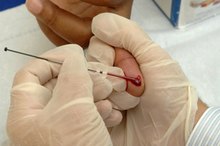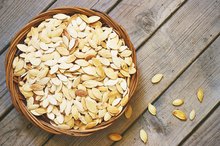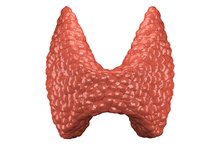Foods Allowed Before a Thyroid Test
The thyroid gland, located in the anterior portion of your neck, produces hormones that determine your metabolic rate or the speed at which your body functions. A variety of lab tests are available to determine thyroid function, each measuring different aspects of stimulation, production and end-products of the thyroid gland. Test preparation is fairly standard with only a few requiring food restrictions, limitations or fasting. Follow your physician's instructions for test preparation.
Function
Thyroid testing is designed to assess the ability of your thyroid gland to respond to stimulation from the brain, specifically from the pituitary gland and the hypothalamus. Testing calculates the production of hormones such as estrogen and testosterone, and evaluates the uptake and reuse of iodine, a mineral, necessary for thyroid function.
Thyroid-stimulating Hormone
What Do CBC, CMP & TSH Test Results Mean?
Learn More
Thyroid-stimulating hormone, referred to as TSH, is secreted by the pituitary gland when stimulated by thyrotropin-releasing hormone, TRH, produced by the hypothalamus in the brain. These hormones prompt the release of triiodothyronine and thyroxine, T3 and T4 respectively, vital to growth and development. The TSH test identifies hypothyroidism and determines the source: thyroid failure, pituitary or hypothalamic malfunction. Some of your medications might be withheld but no food restrictions apply to this test.
T3 and T4
Triiodothyronine and thyroxine, T3 and T4, are hormone tests, as well as part of a thyroid panel test, used to detect the presence of hypothyroidism, low hormone production and hyperthyroidism, excess hormone production and to measure your thyroid's response to medications for treatment of thyroid abnormalities. Some medications, such as steroids, propranolol and cholestyramine, can affect the thyroid gland and might be withheld but no food restrictions or fasting is required.
Thyroid-binding Globulin
Normal Range for Thyroid Level
Learn More
Thyroid-binding globulin, also called TBG, is the main protein carrier in the bloodstream for T3 and T4. This test evaluates abnormal thyroid conditions in which T3 and T4 levels are not clear indicators of thyroid disease and can occur with the use of oral contraceptives and anabolic steroids. No food restrictions or fasting is required but certain medications such as phenytoin, salicylates and thyroid medications as well as estrogen and steroids require withholding.
Additional Testing
Radioactive iodine testing and radionuclide thyroid imaging require fasting the night before and elimination of iodine in your diet, found in seafood such as shellfish, vitamins, iodized salt and iodinated salt substitutes. Radioactive iodine testing calculates the ability of the thyroid to take up iodine to discern primary and secondary thyroid diseases. Radionuclide imaging is used to measure structure, size and position of your thyroid when an enlarged gland or mass is discovered.
Related Articles
References
Writer Bio
Helen Messina started writing in 2010. She is a registered nurse with experience in rehabilitation, long-term/subacute care, pediatric/adult home care and has worked in acute care facilities in Florida, Pennsylvania, New Jersey and New York. Messina's specialties include neurology, cardiac and renal care. She holds an associate degree in nursing from Gannon University.







